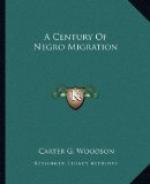The more important development, however, was that of manhood. This was best observed in their growing consciousness of rights, and their readiness to defend them, even when encroached upon by members of the white race. They quickly learned to appreciate freedom and exhibited evidences of manhood in their desire for the comforts and conveniences of life. They readily purchased articles of furniture within their means, bringing their home equipment up to the standard of that of persons similarly circumstanced. The indisposition to labor was overcome “in a healthy nature by instinct and motives of superior forces, such as love of life, the desire to be clothed and fed, the sense of security derived from provision for the future, the feeling of self-respect, the love of family and children and the convictions of duty."[39]
These enterprises, begun in doubt, soon ceased to be a bare hope or possibility. They became during the war a fruition and a consummation, in that they produced Negroes “who would work for a living and fight for freedom.” They were, therefore, considered “adapted to civil society.” They had “shown capacity for knowledge, for free industry, for subordination to law and discipline, for soldierly fortitude, for social and family relations, for religious culture and aspiration. These qualities,” said the observer, “when stirred, and sustained by the incitements and rewards of a just society, and combining with the currents of our continental civilization, will, under the guidance of a benevolent Providence which forgets neither them nor us, make them a constantly progressive race; and secure them ever after from the calamity of another enslavement, and ourselves from the worst calamity of being their oppressors."[40]
It is clear that these smaller numbers of Negroes under favorable conditions could be easily adjusted to a new environment. When, however, all Negroes were declared free there set in a confused migration which was much more of a problem. The first thing the Negro did after realizing that he was free was to roam over the country to put his freedom to a test. To do this, according to many writers, he frequently changed his name, residence, employment and wife, sometimes carrying with him from the plantation the fruits of his own labor. Many of them easily acquired a dog and a gun and were disposed to devote their time to the chase until the assistance in the form of mules and land expected from the government materialized. Their emancipation, therefore, was interpreted not only as freedom from slavery but from responsibility.[41] Where they were going they did not know but the towns and cities became very attractive to them.




